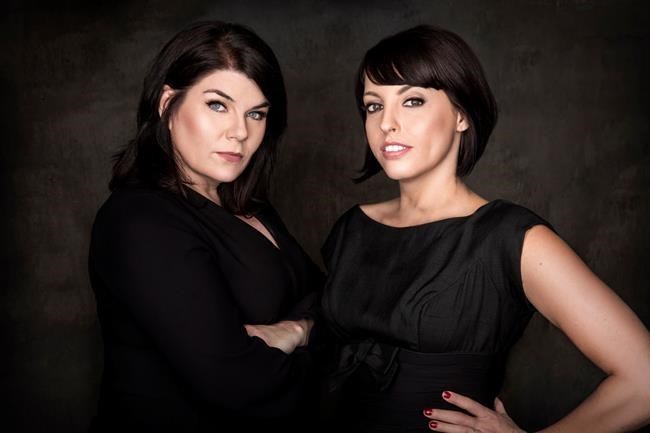
"My Favorite Murder" podcast hosts Karen Kilgariff (left) and Georgia Hardstark, shown in a handout photo, are taping an episode this weekend in front of a live audience of some 3,000 at Toronto's Just for Laughs festival. THE CANADIAN PRESS/HO-Just For Laughs MANDATORY CREDIT
September 27, 2017 - 12:44 PM
TORONTO - Cory Sells started asking around for podcast recommendations last fall, hoping to find something that would make her laugh. When a friend at work suggested a true crime comedy show called "My Favorite Murder," she was "kind of horrified."
But then she started listening.
"I immediately became hooked," said the Connecticut resident. "Now, I don't miss an episode."
Since the unprecedented success of the podcast "Serial," the true crime genre has become mainstream. HBO's "The Jinx," and the Netflix hit "Making a Murderer" have been among the buzziest shows of the last few years.
As the genre continues to expand, true crime has started to reach the world of comedy. The conversational storytelling show "My Favorite Murder" is the third most popular podcast on the iTunes comedy chart. This weekend, hosts Karen Kilgariff and Georgia Hardstark are taping an episode in front of a live audience of some 3,000 at Toronto's Just for Laughs festival.
While murder mysteries have entered comedy clubs and theatres, true crime is also a prime target for parody. The new Netflix mockumentary series "American Vandal," about whether a high school stoner is responsible for phallic graffiti, takes direct cues from "Making a Murderer."
Murder and comedy may not seem like a natural fit, but fans say there's something cathartic about a lighthearted approach to real-life horror.
"I think I was drawn to ("My Favorite Murder") because the humour lightens up a very scary topic," said Sells.
When Sells, a psychologist, had a baby seven years ago, she said she experienced what she's now identified as postpartum anxiety.
"It was keeping me up at night," she recalled. "Horrible thoughts going though my head: 'What if he's kidnapped?' I think all new moms are hyper-vigilant, but I was catastrophizing."
Years later, she's thought about how helpful the podcast would have been after her son's birth. The show's humour allows her "to listen to the stories and not be terrified. It's a safe way to expose myself and inoculate myself to my own worst fears."
When comedian Colin Munch was developing the live improvised detective show "True Blue" at Toronto's Bad Dog comedy club last year, he said people were initially skeptical. Although he explicitly says the show is not a comedy, he understands that its improv premise, cast of known comedic performers and affiliation with a comedy bar might lead people to expect humour.
Although the story changes at every performance, Munch's show always includes a few funny scenes. When he met with detectives to do research, he said they were excited to talk to a comedian.
"All of the detectives that I spoke to had an anecdote," he said. "They were like, 'You can't share this with anyone else, but this is something that has happened in the course of my career that was funny. It was funny because it helped us deal with this trauma, deal with this stress.'"
Laughter is "a release of an uncomfortable mental state," said Steve Joordens, a psychology professor at the University of Toronto. He likens the humour of these shows to the comfort his family got recalling funny stories at a relative's hospital bedside.
"(Laughing) wasn't disrespectful, it was necessary," he said. "You feel a little guilty for laughing, but if other people are laughing, it's like we have an unspoken agreement that we're coping."
Of course, not everyone copes in the same way. A late September episode of "My Favorite Murder" addressed a recent incident at a live show in Melbourne, Australia, where a heckler suggested the hosts callous and offensive.
Sells said it was clear the audience member wasn't a regular listener.
"Karen and Georgia are very clear that they are not making light of the murders themselves," she said. "They are laughing at themselves, really. Had he listened previously, this distinction would have been clear."
That the victim is never the source of the humour is also an important distinction for Munch.
"We made it very clear that we weren't making fun of anyone who's experienced trauma," he said. "There were people in our cast and our creative team that have experienced close calls, and we tried to approach it as storytellers with the right amount of emotional maturity and respect."
News from © The Canadian Press, 2017